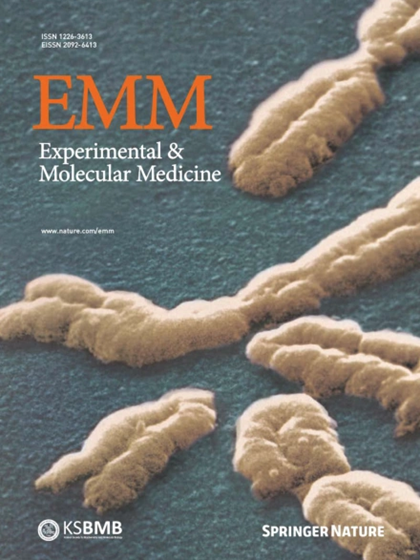过度表达细胞因子的树突状细胞用于癌症免疫治疗。
IF 9.5
2区 医学
Q1 BIOCHEMISTRY & MOLECULAR BIOLOGY
引用次数: 0
摘要
树突状细胞(dc)是体内抗原呈递细胞的主要类型,通过从病变细胞中采集抗原,为随后的抗原特异性T细胞和B细胞启动,作为适应性免疫的关键介质。虽然dc可以分泌多种细胞因子,深刻地塑造免疫环境,但通常需要外源细胞因子来维持dc、T细胞和B细胞的存活、增殖和分化。然而,传统的细胞因子治疗癌症的方法由于其低疗效和严重的副作用而受到限制。细胞因子在dc中的过度表达,随后是旁分泌释放或膜显示,已成为控制细胞因子暴露于相互作用的dc和T/B细胞的可行方法。这种方法可以潜在地减少细胞因子的必要剂量和相关的副作用,以达到相当或增强的抗肿瘤疗效。已经开发了各种策略来实现细胞因子在dc上的过表达或化学偶联,以随后调节DC-T/ b细胞相互作用。本文简要概述了通过基因工程或化学修饰方法使细胞因子在树突细胞内或树突细胞上过表达的策略,并讨论了细胞因子过表达树突细胞对新一代癌症免疫治疗发展的前景。本文章由计算机程序翻译,如有差异,请以英文原文为准。

Cytokine-overexpressing dendritic cells for cancer immunotherapy
Dendritic cells (DCs), the main type of antigen-presenting cells in the body, act as key mediators of adaptive immunity by sampling antigens from diseased cells for the subsequent priming of antigen-specific T and B cells. While DCs can secrete a diverse array of cytokines that profoundly shape the immune milieu, exogenous cytokines are often needed to maintain the survival, proliferation, and differentiation of DCs, T cells, and B cells. However, conventional cytokine therapies for cancer treatment are limited by their low therapeutic benefit and severe side effects. The overexpression of cytokines in DCs, followed by paracrine release or membrane display, has emerged as a viable approach for controlling the exposure of cytokines to interacting DCs and T/B cells. This approach can potentially reduce the necessary dose of cytokines and associated side effects to achieve comparable or enhanced antitumor efficacy. Various strategies have been developed to enable the overexpression or chemical conjugation of cytokines on DCs for the subsequent modulation of DC–T/B-cell interactions. This review provides a brief overview of strategies that enable the overexpression of cytokines in or on DCs via genetic engineering or chemical modification methods and discusses the promise of cytokine-overexpressing DCs for the development of new-generation cancer immunotherapy. Cancer immunotherapy has transformed cancer treatment, particularly with immune checkpoint blockades and CAR T cell therapy. However, cancer vaccines have been less effective. Researchers investigated ways to improve cancer vaccines by targeting dendritic cells and cytokines. DCs are immune cells that present antigens to T and B cells, starting immune responses. The study involved genetically or chemically modifying DCs to produce more cytokines like IL-2 and IL-12. This aimed to better activate T cells and enhance the immune response against tumors. Results showed that these modified DCs significantly increased T cell responses and reduced tumor growth in mice. Researchers concluded this could improve cancer vaccine effectiveness and reduce side effects. Future studies may refine cytokine combinations and delivery methods for clinical use. This summary was initially drafted using artificial intelligence, then revised and fact-checked by the author.
求助全文
通过发布文献求助,成功后即可免费获取论文全文。
去求助
来源期刊

Experimental and Molecular Medicine
医学-生化与分子生物学
CiteScore
19.50
自引率
0.80%
发文量
166
审稿时长
3 months
期刊介绍:
Experimental & Molecular Medicine (EMM) stands as Korea's pioneering biochemistry journal, established in 1964 and rejuvenated in 1996 as an Open Access, fully peer-reviewed international journal. Dedicated to advancing translational research and showcasing recent breakthroughs in the biomedical realm, EMM invites submissions encompassing genetic, molecular, and cellular studies of human physiology and diseases. Emphasizing the correlation between experimental and translational research and enhanced clinical benefits, the journal actively encourages contributions employing specific molecular tools. Welcoming studies that bridge basic discoveries with clinical relevance, alongside articles demonstrating clear in vivo significance and novelty, Experimental & Molecular Medicine proudly serves as an open-access, online-only repository of cutting-edge medical research.
 求助内容:
求助内容: 应助结果提醒方式:
应助结果提醒方式:


